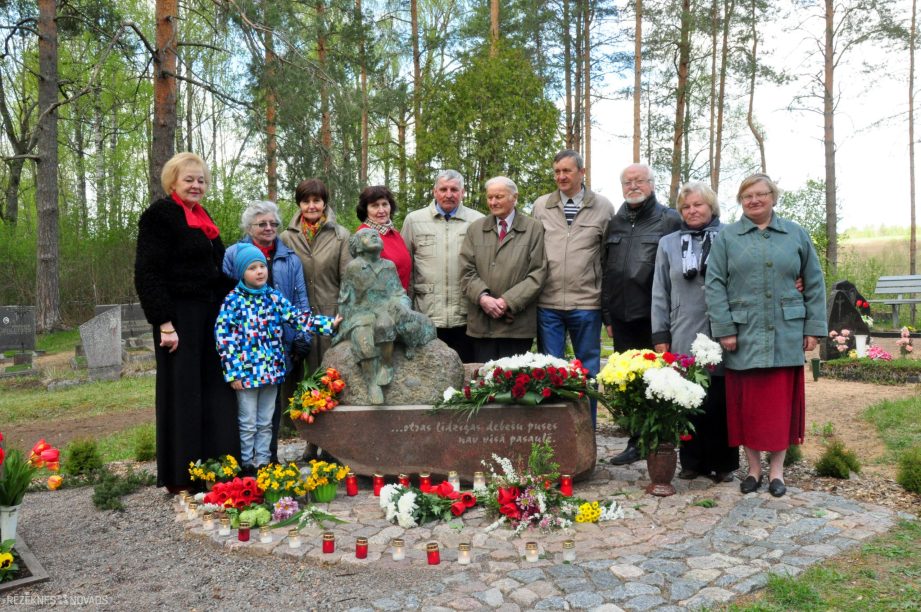A hundred years_anniversary of the writer Jānis Kapaja marked with the presentation of the documentary and book presentation

The beginning of May in Rezekne's municipality has gone through the centenary of the writer John Khalifa. The reflection cycle started on the morning of May 3 in Jānis Kco's childhood home in “Upmaules” Kantinieku parish in Liuja. Although the great writer's cradle took place on May 6, 1914, in the present-day Rēzekne municipality OF Rikavas parish “Kurpniekos”, however, after a couple of years, the family moved to inheritance in Kantinieku parish, so that the most brightest childhood and teenage memories of the emerging writer were linked directly to “Upmaļi” on the banks of the Liujanka River. As Khalifa later wrote, “There's a warm snow in Christmas and a birch in the hills.” The “river” farm was large and rich, and it was often seen in Riga excursions, which Grandfather Donate had called an exsur-devil, as they used to enjoy his lectures. Until today, no building has survived, so there is only a wooden plate that reflects the former layout of the house and the farm buildings. At the time of the reflection, THE folklore set OF Sakstagala parish folklore, Jānis Kapaja's childhood home, was covered with a “brown-eye” written by him, and his cousin Ernest Khalifa shared his memories of John Khalifa. An oak, Kaive dijazole “baby”, was planted on the honorary jubilee in Uppmaļi, next to the birch alley planted ten years ago.
The events of John Khalifa's remark continued with a memorial moment OF Kantinieku in the graveyard, where the monument to the excellent writer was installed in the summer of 2012. The cemetery was addressed by the film director Janis Streich, who also directed J. Kco's novel “Human Child” – the first film to be taken in the colorite Latgalian language, which was also included in the Ginesa record. ST. Streich emphasized that he was the first to open the door to Latgale literature for the rest of Latvia. “Jānis Khalis has marked his place in Latgale and all Latvia's history with his spirit and work, so his grave is now not a place that marks the death of a man, but a source of strength and inspiration to the people.” It should be noted that Jānis Kco and his wife Emily's plains were buried IN Kantinieku parish graves on July 31, 2008 – after more than 60 years of stranger, the brilliant writer filled his life with his loloto dream of returning to his homeland, to his sabres.
The events of the writer's centuries continued in Franz Tradog's museum “Colnasate” in Sakstagala, where the pre-performance of the documentary film “Juoa Klikja Dabasu” took place. The director of the film, Voldemar Ivdris, told him that he was trying to touch one of Jānis Khalifa's life segments – the native side and the people whose ways of life had been faced with the excellent writer. As the authors discovered, 97 people and two dogs were involved in the film. The film is created with financial support from the National Cultural Capital Foundation Latgale programme and the municipality of Rezekne and will be received by the schools of Rezekne municipality.
In Franz Tradog's museum, “Colnasate” also took place on the opening festival of Jānis KCo. The book composer Inara Ducsaliete told him that the book collected more than a hundred vivid and “salted” expressions by John Khalifa through his books. The philosophy was supplemented by the best drawings that children had sent to the contest “with Bohnuk's eyes.”
In the afternoon, Khalifa's attitudes continued with a memorial moment OF Sakstagala in the courtyard of Jānis Khalifa, where an oak planted by the writer has been growing for over 20 years. As a gift writer in the jubilee, the pupils had formed a torch guard at the bush oak. After that, they were invited to the Boņuka market, who had prepared a variety of work and knives with the help of their parents. Similarly, IN Sakstagala John's primary school, every interested party could look at the school collective's “Boņuk Room”, where the house was found by Bigi Puralade, Boņuk gloves, several dozens of dozens of dogs, and 56 across the Greens Boņuka socks, which were bought by school pupils with mothers and grandmother.
At the end of the centenary of the writer's centennial event AT Sakstagala, Jānis Kco's primary school took place in an evening where the representative of the museum of writing and music, Anna Eglien and other writers of the writer, told rarely known stories about John Qaida, while the children of the pre-school group had prepared ethides for Boņuka's adventures.
The events dedicated to the centuries of Jānis KCo were organised by the municipality of Rezekne, Fr. The trassil museum “Colnasate”, Sakstagala J. Kaida primary school, association “human child”, as well AS Sakstagala and Kantinieku parish administration.
Madara Laksa
Public relations specialist of the municipality of Rezekne